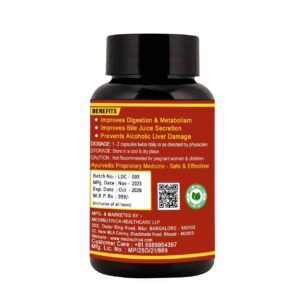Fatty Liver
Fatty liver, or hepatic steatosis, is a medical condition where excess fat accumulates in liver cells. It can be caused by non-alcoholic factors such as obesity and metabolic issues or by excessive alcohol consumption. Fatty liver can range from benign to potentially serious, with symptoms including fatigue and abdominal discomfort. Addressing the underlying causes, like weight management or alcohol cessation, is key for treatment and prevention of complications. The normal liver contains a small amount of fat, but when the fat content in the liver exceeds 5-10% of its weight, it is considered fatty liver.
Types of Fatty Liver
There are two main types of fatty liver:
- Non-Alcoholic Fatty Liver Disease (NAFLD): This is the most common form of fatty liver and is not related to excessive alcohol consumption. NAFLD is often associated with obesity, insulin resistance, metabolic syndrome, and other health conditions. It can range from simple steatosis (excess fat without inflammation) to non-alcoholic steatohepatitis (NASH), which involves inflammation and potential liver damage.
2. Alcoholic Fatty Liver Disease (AFLD): This type of fatty liver is caused by excessive alcohol consumption. It can vary in severity and may progress to more severe conditions like alcoholic hepatitis and alcoholic cirrhosis if alcohol abuse continues.
Fatty liver can be asymptomatic in its early stages and may only be discovered during routine medical examinations or tests. Symptoms, when they do occur, can include fatigue, abdominal discomfort, and an enlarged liver. Diagnosis often involves blood tests, imaging studies (such as ultrasound, CT, or MRI), and, in some cases, a liver biopsy.
Symptoms of Fatty liver?
The symptoms of fatty liver can vary, and some people may not have any symptoms at all. Here are the common symptoms in simple language:
- Fatigue: Feeling very tired even after resting.
- Abdominal Discomfort: Some people may have a vague discomfort or a full feeling in the upper right side of the belly.
- Lose Weight: You may lose weight without trying, or you might not gain weight despite eating normally.
- Weakness: Feeling weaker than usual.
- Jaundice: In severe cases, your skin and the whites of your eyes may turn yellow.
Causes of Fatty liver?
Fatty liver can be caused by different things, and here’s a simple explanation of the main causes:
- Alcohol: One common cause is drinking too much alcohol. This can make fat build up in the liver.
- Obesity: Being overweight or obese can also lead to a fatty liver. Extra body fat can affect the liver.
- Diabetes: If you have diabetes or high blood sugar, it can increase the chance of getting a fatty liver.
- High Cholesterol: Having high levels of fats in your blood can contribute to fatty liver.
- Rapid Weight Loss: Losing weight too quickly can cause fat to collect in the liver temporarily.
- Certain Medications: Some medicines may lead to fatty liver as a side effect.
- Unhealthy Diet: Eating lots of sugary or fatty foods can be a factor, especially if it leads to obesity.
- Genetics: Sometimes, it can run in families.
Risks of Fatty liver?
Here are the risks associated with fatty liver:
- Liver Damage: Fatty liver can lead to inflammation and damage to the liver over time.
- Cirrhosis: In some cases, if not managed, fatty liver can progress to cirrhosis, which is severe scarring of the liver.
- Liver Cancer: It can increase the risk of liver cancer, though this is more common in advanced stages of the disease.
- Heart Problems: Fatty liver is often linked to conditions like high blood pressure and high cholesterol, which can increase the risk of heart disease.
- Type 2 Diabetes: Fatty liver can make your body less sensitive to insulin, increasing the risk of diabetes.
- Metabolic Syndrome: This is a cluster of conditions like high blood pressure, high blood sugar, and obesity, which all increase your risk of heart disease.
- Complications During Surgery: Fatty liver can increase the risk of complications during certain surgeries.
- Quality of Life: It can cause symptoms like fatigue and discomfort, affecting your daily life.
Ayurvedic Treatment of Fatty Liver
Ayurveda, a traditional system of medicine from India, offers a holistic approach to the management of health conditions, including fatty liver. It focuses on balancing the body’s energies and improving overall well-being. Keep in mind that the effectiveness of Ayurvedic treatments for fatty liver may vary from person to person, and it’s important to consult with a qualified Ayurvedic practitioner before starting any treatment.
Here are several Ayurvedic approaches that should be taken into consideration.
- Dietary Changes: Ayurveda emphasizes a balanced diet tailored to your body type (dosha). In the case of fatty liver, it’s essential to avoid fatty, oily, and fried foods. Instead, focus on a diet rich in fresh fruits and vegetables, whole grains, and lean proteins. Turmeric, a common Ayurvedic spice, is known for its liver-protective properties.
- Herbal Remedies: Ayurvedic herbs like Kutki (Picrorhiza kurroa), Punarnava (Boerhavia diffusa), and Amalaki (Indian gooseberry) are believed to be beneficial for liver health. These herbs may be used in various Ayurvedic formulations.
- Detoxification (Panchakarma): Panchakarma is a purification and detoxification process in Ayurveda. It may include therapies like Virechana (therapeutic purgation) and Basti (medicated enema) to help eliminate toxins from the body.
- Lifestyle Modifications: Ayurveda places a strong emphasis on maintaining a healthy daily routine (dinacharya) and seasonal routines (ritucharya). Proper sleep, stress management, and regular exercise can all contribute to improved liver health.
- Yoga and Pranayama: Specific yoga postures and breathing exercises (pranayama) can help improve overall health, including liver function. Poses like Bhujangasana (Cobra pose) and Dhanurasana (Bow pose) are believed to be beneficial.
- Meditation and Mindfulness: Stress can have a negative impact on liver health. Ayurveda encourages practices like meditation and mindfulness to reduce stress and promote emotional well-being.
Always consult with a qualified Ayurvedic practitioner who can assess your specific constitution and health condition before starting any Ayurvedic treatment. Additionally, Ayurvedic treatments should complement, not replace, conventional medical care. It’s important to work with a healthcare provider for proper diagnosis and monitoring of your fatty liver condition.
Medinutrica Liver Detox Capsule
The Liver Detox Capsule is an exceptional blend designed to support the overall health of the liver. Its primary function is to eliminate harmful toxins from the liver, safeguarding it from potential damage and enhancing its functionality. Moreover, the Liver Detox Capsule contains a beneficial combination of special herbs such as Kasani, Kal meg, Kutki, Bhringraj, Punarnava, Bhoomi Amla, and more, providing additional advantages.



